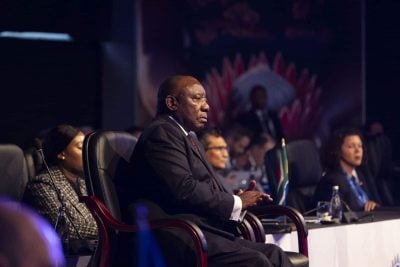Football agents who can spot talent and ‘sell’ their protégés to big European clubs can and do earn fortunes for the players as well as themselves. Some professionally registered African agents have unearthed great stars from the continent but the industry is now reeling from a swarm of unregistered ‘agents’ who con aspiring young players and their parents with dreams of glory they cannot deliver. But faced with this problem, Fifa, to everyone’s surprise, has opted for less regulation rather than tighter policing. Report by Leslie Gordon Goffe.
Football is a business, not a game, to the thousands of Africans who have set up shop as sports agents intent on getting a piece of the $300bn global soccer industry by signing footballers they believe will become big name, big money players in the big football leagues in Europe.
With an agent taking a commission of as much as 10% of a playera’s transfer contract, salary, and any endorsements or other business deals, discovering and signing a footballer who goes on later to become a superstar like Cameroonian Samuel Eto’o – who was at one time the world’s highest-paid player with a salary of $27m a year – could make a lucky agent millions.
“This is a big business, and everybody wants a part of it,” says Ralph Nkomo, a Zimbabwe-born, South Africa-based football agent who has represented some of the best-known names in African football. His clients include players such as Zimbabwean Benjani Mwaruwari, a top goal-scorer who has played for Manchester City, and Beninese midfielder , who plays for West Bromwich Albion in England.
Nkomo owns and operates his own player agency and management company in South Africa, Ralph Sports International. For many years he worked as the chief scout in Africa for England’s Portsmouth football club, and reckons during this time he helped arrange more than $100m in transfers involving African players.
“When you have a big player you can tell a team to ‘show me the money’, like Jerry Maguire in that film,” says Nkomo, referring to the sports agent played by Tom Cruise in the Hollywood film Jerry Maguire.
“But, if you bring a team a player who is not up to it, they will not call you back again. It takes skill to be a good deal maker, skill.”
Working as a football agent really does take skill, Nkomo says. It takes skill brokering and negotiating employment contracts and securing endorsement and other investment opportunities, he says. And it takes yet more skill, Nkomo says, for an agent to keep current and up to date on finance, business management and risk analysis in an ever-changing sports marketplace.
A lucrative business
There is money in it too. Nkomo’s business has bought him a nice house in a good neighbourhood and several luxury cars: a Porsche Cayenne; a Mercedes ML-Class SUV; and a Mini Cooper that his wife drives. Nkomo says he earns not very much in a bad year and above £1m ($1.25m) in a good year. But all is not well in the world of licensed football agents.
One of around 600 football agents licensed and accredited in Africa by Fifa, football’s international governing body, Nkomo is not happy at the flood of unlicensed agents that have arrived recently on the scene and turned his business, he says, into an unregulated Wild West.
Despite Fifa’s best efforts to regulate the field, more than 2,000 or so unlicensed agents – some legitimate, most not – have all but taken over the football agent business in Africa.
The football business – both on the field and off field – is growing so fast, Fifa admits, it has failed to enforce its own regulations and requirements, among them ensuring those claiming to be agents have passed Fifa’s famously tough exam and thus are properly licensed and accredited to guide a footballer’s career.
These “agents of nothing” get their start in the football agent business by convincing eager parents, greedy for riches, that their son will be the next African football superstar.
Fifa reluctantly admitted recently that 70% of worldwide football transfers – amounting to billions of dollars – are now handled by unlicensed, unaccredited agents.
And though he still earns a nice living, Ralph Nkomo complains that food is being taken out of the mouth of licensed, legitimate agents like him.
“Every second person in Africa is an agent!” snorts Nkomo, dismissively. “Agents of what?” he asks, rhetorically. “Agents of nothing,” he answers. “Agents of nothing.”
These “agents of nothing” get their start in the football agent business by convincing eager parents, greedy for riches, that their son will be the next African football superstar. Many are thus persuaded to sell their homes or other valuables to get the money to enrol their children in football academies run by agents. It is a small price to pay, the agent assures them, for the big money that will surely come their way when their children become big-time footballers abroad.
Unlicensed agents
Few of these young footballers make it, of course. But some unlicensed agents get paid, either way. It’s the same in Ghana, where hundreds of unlicensed agents operate without regulation.
If these footballers do, somehow, succeed, agents will gobble up most of their money, leaving them indebted and penniless. For most, though, it will end up much worse. They will find themselves discarded in Europe with not even football boots on their feet.
Smuggled there – sometimes across the sweltering Sahara Desert – they will end up abandoned in the streets of Marseille, Brussels and Paris, the promised trial with French football champions Paris Saint-Germain just a big lie.
Instead of a life in football, playing, perhaps, for Olympique Marseille or, perhaps, for Manchester United, the African teenagers will spend their lives as undocumented immigrants, dodging the authorities and selling fake Gucci and Hermès designer bags on the streets of Europe.
The Ivorian footballer Emmanuel Eboué, who has played for Arsenal in England and top Turkish side Galatasaray, considers himself very lucky to have avoided this fate on the way to football fame. “There are some bad agents out there,” he says, aptly.
And though the European Union has promised to clamp down on the trafficking of young African football hopefuls, nothing has so far been done to stem the flow of the estimated 15,000 youngsters sent illegally from Africa to Europe each year by unscrupulous, unlicensed agents.
Association of agents
To try and isolate the unlicensed agents who’ve turned the football agent business upside down, Karabo Mathang-Tshabuse, the first Fifa-licensed female football agent in South Africa, recently set up the Association of Accredited Agents in Johannesburg.
“The accredited agents in our country have come together and,” says Mathang-Tshabuse proudly, “decided ‘let’s not be dogs to one another’. This is one small way we are trying to curb this dirty, murky industry.”
It is not just unlicensed football agents that have been accused of wrongdoing. Several top licensed agents, too, have been implicated over the years in corruption scandals involving the transfer of a player from one team to another.
In November 2014, French police arrested former agent Senegalese Mababa ‘Pape’ Diouf to find out whether Diouf, once the most powerful agent in France, and the first black person to be appointed president of a major football club in France, took illicit commissions on transfers.
Nonetheless, Ralph Nkomo complains that African agents who are fully licensed and fully accredited by Fifa are being undermined by the double dealing and deceit of untrained, unqualified agents who promise players the world, and give them nothing.
Mike Makaab worries about this, too. The first football agent in South Africa ever to be licensed and accredited by Fifa, Makaab, CEO of Prosport International, Africa’s largest sports agency, worries about the damage being done to Africa’s youth by football traffickers, and worries, too, about how all this is affecting his bottom line and the football agent business.
“I think there are some fantastic agents in Africa, and also some fly-by-nights,” says Makaab. “You know, wherever great amounts of money are to be made, you’re bound to find people who don’t operate honourably.”
Makaab is eager to showcase the cleaner side of what has become a very dirty profession. His agency, Prosport International, is, Makaab says, a “one-stop shop of player sports management” with its own marketing department, tax and investment division, legal division, and a retirement division which prepares players for the future, and the time when their footballing days are over.
“Look, I will do just about anything to earn my commission, including take my players’ sick pets to the vet, arrange for a gardener to mow their lawns and even, on occasion, counsel players on how to get over a broken heart after a love affair,” laughs Makaab, on the phone from Germany, where he has gone, he says, to attend to the many and various needs of four of his clients playing in Belgium, two in Holland, and one in Germany.
“Look, we want to be looked upon as serious and professional business men and women, and so,” Makaab says, “we need to be eradicating the fly-by-nights.”
And that’s exactly what Fifa hopes will happen when its new measures regulating the football agent business come into effect in April 2015.
Less regulation
Instead of greater regulation, surprisingly, there will be less regulation. Licensed agents had hoped Fifa would clamp down on unlicensed agents, but Fifa has decided to replace all agents – both the unaccredited and the accredited – with a new category of player representative, the intermediary. Intermediaries will not have to pass an exam or hold a licence in order to represent a footballer, as was the case previously.
Anyone, Fifa says, who has an “impeccable reputation” and who has not been convicted of a financial crime or a crime involving violence, can represent a football player or football club in contract or transfer negotiations.
Intermediaries will not be happy, though, to hear that the commission they are entitled to on a player’s basic gross income will be slashed by a half, and capped at 3%. Typical commission averaged between 7 and 10% before, though Fifa revealed that in many cases agents were pocketing commissions of as much as 28% on some international transfers.
Perhaps the most important of the measures Fifa plans on implementing is its decision to target the activities of agents who have made a booming business out of exploiting young African football hopefuls. Intermediaries may not, Fifa says, receive any remuneration at all from services provided to a player who is under the age of 18. Still, despite all this, some are not happy with Fifa’s reforms, and view its measures as a capitulation.
“We need more regulation and more strength if we want to eliminate those trying to make a quick buck at the expense of their fellow human being,” says Makaab.
But the truth is, Fifa had little choice but to revamp the football agent system, inviting unlicensed agents in from the cold and from their dealings on the fringes of the industry.
After all, unlicensed agents have their hand in, and are responsible for, over 70% of international transfers, and thus, effectively, control the world’s football agent business, which Fifa’s president, Sepp Blatter, boasted recently is “the biggest business in the world.”
Angry that their piece of the football business will, likely, shrink when the new Fifa regulations come into effect in April, associations representing licensed football agents, in Africa and elsewhere, have charged that the new measures are anti competitive and violate the law.
England’s Association of Football Agents has appealed to the European Commission to throw out Fifa’s planned deregulation which, the Association’s chairman, Mel Stein, claims will lead to the “annihilation” of the industry and reduce football to a “circus” in which intermediaries get double and triple the new 3% cap on commission by simply arranging to be paid for their cooperation in a big transfer, off the books and out of sight.
If the new Fifa regulations are enforced, it will be, predicts Mel Stein pessimistically, “like bees around a honey pot because of the money, and there will be an awful lot of bees out there stinging everybody.”
But like it or not, on 1st April 2015, the football agent industry – whether in Africa or abroad – will be entirely changed. It will be one big melting pot and one big free for all, with no distinction between licensed and unlicensed.
“The Fifa change that is coming poses a threat to good, and bad agents alike,” says licensed agent Karabo Mathang-Tshabuse, a little wistfully. “But, you know, I think agents want to do the right thing, so we need to be open, and embrace, the change that is certainly coming in this industry of ours.”
Want to continue reading? Subscribe today.
You've read all your free articles for this month! Subscribe now to enjoy full access to our content.
Digital Monthly
£8.00 / month
Receive full unlimited access to our articles, opinions, podcasts and more.
Digital Yearly
£70.00 / year
Our best value offer - save £26 and gain access to all of our digital content for an entire year!
 Sign in with Google
Sign in with Google 


